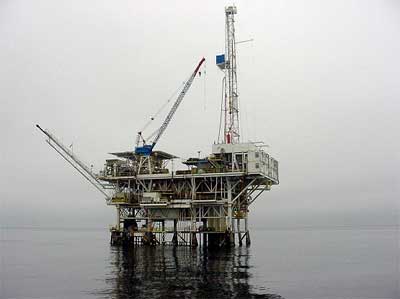Offshore Oil Drilling Should Be Shut Down, Not Expanded
Venoco's Proposal Would Quadruple Output from Vintage Platform Holly

Santa Barbara County’s offshore oil infrastructure is decrepit, much of it even older than the corroded Plains All American Pipeline that caused last year’s devastating oil spill. It should be decommissioned to prevent yet more disasters and protect our climate. But instead, Venoco — which operates several platforms in the Santa Barbara Channel — wants Californians to hand over untapped marine sanctuary property that would keep the crude flowing through Platform Holly for decades to come.
The proposal is almost too audacious to believe. Oil production from one of Venoco’s offshore leases in the South Ellwood Field has slowed to a trickle, so it wants to trade that area for 3,400 acres in the California Coastal Sanctuary, where it would nearly quadruple its daily output. If permitted, the lease swap would breathe dirty new life into Platform Holly, the Ellwood Onshore Facility, and the Plains pipeline system that spewed more than 140,000 gallons of oil into Santa Barbara County’s environment last year.
So Venoco would get California’s help in emerging from bankruptcy, and our coastline and climate would pay the price. At a moment when this country and others around the world are struggling to reduce carbon emissions and address climate change impacts, from superstorms to ocean acidification, it makes no sense to expand oil production in California’s vulnerable coastal zone.
That’s why community leaders, environmentalists, and people of all stripes are coming together on Wednesday, October 19, to rally in opposition to this proposal when the California State Lands Commission holds a hearing on the project at Goleta City Hall.
When ARCO installed Platform Holly in 1965, the plan was to decommission the platform sometime between 2015 and 2020. That’s right now, folks. Yet even though oil production from the South Ellwood Field peaked in 1984 and has been declining ever since, Venoco wants to squeeze every drop it can from this field, no matter the risks. And the risks are significant.
Hundreds of birds and marine mammals died during the Refugio Oil Spill. Even though the California Attorney General’s Office has charged Plains with criminal negligence for failing to properly maintain its severely corroded pipeline, the reality is that spills are increasingly likely in this decades due to old oil infrastructure.
An analysis of federal oil spill data from 1986–2014 by the Center for Biological Diversity found there have been 621 serious pipeline incidents in California, or more than 20 per year, causing almost 50 deaths and at least $793 million in property damage. That analysis shows the risk of pipeline leaks doubles as pipelines age from 20 to 40 years and continues to increase thereafter. The pipeline connecting Platform Holly to shore is roughly 50 years old, increasing the risk of more spills into California’s coastal environment — especially if Venoco increases the amount of oil pumping through it every day nearly four times over.
California has wisely banned new offshore oil leasing in its state waters — which Venoco is using a legal loophole to try to circumvent — and recently asked the Obama administration to permanently ban new leasing in federal waters off California’s coast. All our state waters deserve the same protection. Offshore drilling is just too risky, particularly as climate scientists tell us we need to keep untapped oil safely in the ground to avoid the most disastrous climate change scenarios.
Rather than letting Venoco continue drilling for another 25–40 years, the state should work with the company on decommissioning Platform Holly and its surrounding oil infrastructure. The conversion to clean energy must start right here and right now.
Kristen Monsell is an attorney with the Center for Biological Diversity.



